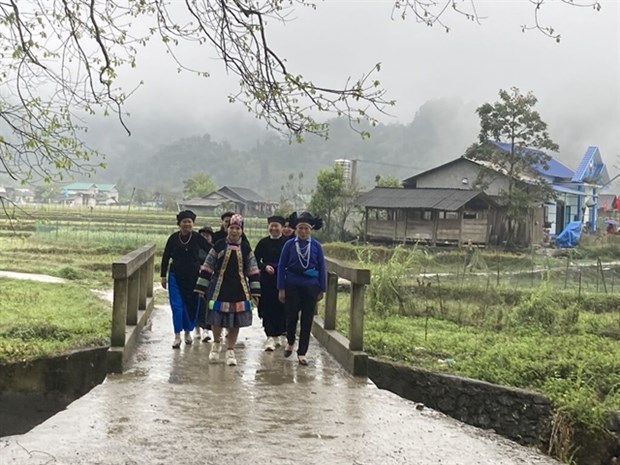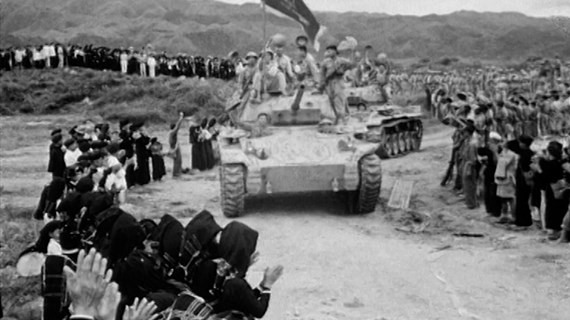Ha Giang: a role model for community-based natural disaster mitigation
Concrete roads, electricity systems, and flood-resistant bridges have made the border commune of Tung Vai in Quang Ba Quản district, which is one of the most natural disaster-prone regions in the northern mountainous province of Ha Giang, more robust.
 A flood-resistant concrete bridge at Ban Thang hamlet facilitates local travel. (Photo: VNA)
A flood-resistant concrete bridge at Ban Thang hamlet facilitates local travel. (Photo: VNA)A solar-powered lighting system consisting of more than 20 lights and power poles has brought light to the rural location, thanks to the support of ActionAid International in Vietnam.
Vuong Phat Quy, a resident of Suoi Vui hamlet, said the solar-powered light system helps save electricity. Installing it is simple and environmentally friendly since there is no need to connect cables to the grid.
All the villagers have to do is to put in the frame and then raise the pole. According to him, this has great significance for residents in isolated and hilly places.
The Tung Vai Commune Youth Union Secretary Phan Chan Phuc said the commune’s union installed the lighting system in December 2023. The system runs bulbs with capacity of 300 watts each and an automatic control system to minimise consumption.
He said: “Since the lightbulb has a light sensor and turns on and off automatically, it doesn't require much effort.”
Its lighting duration is extended, providing two to three days of backup during overcast weather devoid of sunlight. According to Phuc, the method has aided in keeping the hamlet safe and orderly, especially when it comes to helping residents evacuate amid significant floods.
Deputy Chairman of the commune Luc Giang Bang said residents have found the solar-powered lighting system to be effective in boosting output and the local economy. This light represents not just electricity but also the policies and laws of the Party and the State and the social development.
The flood-resistant concrete bridge at Ban Thang hamlet, Tung Vai commune, works in tandem with the solar lighting system to provide assistance to the inhabitants in battling natural calamities.
ActionAid funded the project, with some donations coming from locals.
Beginning in October 2022, the bridge's construction spanned 2.5 metres in width and 9 metres in length. It opened for traffic in December 2022.
Then Thi Cham, a villager, told Vietnam News Agency that before the bridge was built, the villagers had to cross the creek by foot using two iron rails.
Nguyen Thi Thuy, Secretary of the Ban Thang Village Youth Union, said a few years ago, locals would not have dared to dream of a large concrete bridge. Although the community is irrigated by the Ban Thang Stream, the stream also poses a hazard to local life.
"The entire region was submerged when the river rose. Nobody was able to cross the river for several days,” she said.
More than 7,000 residents of Tung Vai commune were spared isolation amid the floods thanks to the Ban Thang Bridge. About 130 children from 50 households no longer have to miss lessons due to floods.
Evaluating the models assisting natural disaster prevention and control in Ha Giang province, Pauline Tamesis, United Nations resident coordinator in Vietnam, said work on natural disaster prevention and control needed to be grounded in people's real needs. ActionAid International in Vietnam has implemented practical solutions such as flood-proof bridges and solar-powered lighting systems that are well-suited to the current circumstances in Ha Giang.
Community-based model
Since 2007, ActionAid International in Vietnam has been implementing a community-based initiative for the prevention and control of natural disasters in Quan Ba district, Ha Giang province.
Each participating village develops community-based strategies for disaster prevention and control every year using tools for risk assessment.
All communes involved in the programme so far have created plans for preventing and controlling natural disasters. These plans are easily linked to the district agriculture department's operations and budget, as it is the agency in charge of organising local efforts to prepare for and respond to natural disasters.
According to Do Quang Dung, Deputy Chairman of the Quang Ba district People's Committee, 100% of villages in five communes and one town have adopted instruments for risk assessment and public awareness raising in order to proactively prevent and mitigate risks from natural disasters in the area.
Chief Representative of ActionAid International in Vietnam Hoang Phuong Thao said preparation, reaction, and recovery are three main goals of ActionAid's natural disaster prevention and control programme.
Programmes are carried out in accordance with the circumstances of each locality, she said.
Through grassroots projects, ActionAid Vietnam's programmes give organisations a significant opportunity to contribute to the prevention and control of natural disasters, she said./.













